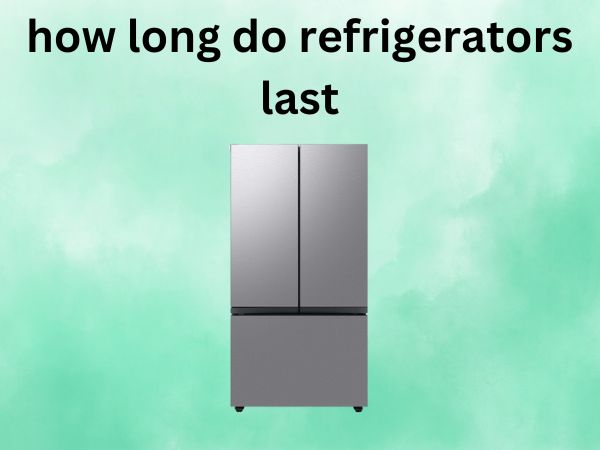How Long Do Refrigerators Last [Your Complete Guide to Appliance Longevity]
Picture this: you’re standing in your kitchen, listening to your refrigerator make that weird humming noise it’s been making for weeks. You start wondering, “How much longer will this old friend serve me?” It’s a question we’ve all pondered at some point, especially when facing the daunting prospect of appliance shopping.
Your refrigerator is arguably the hardest-working appliance in your home, running 24/7 to keep your food fresh and your family fed. But like all good things, even the most reliable fridge won’t last forever. Understanding how long refrigerators typically last can help you plan your budget, recognize warning signs, and make informed decisions about repairs versus replacements.
Table of Contents
The Average Refrigerator Lifespan: What to Expect
Standard Refrigerator Life Expectancy
Most refrigerators have a lifespan of 10 to 20 years, with the sweet spot being around 13 years for the average unit. Think of it like a reliable car – with proper care and maintenance, it’ll serve you well for over a decade, but eventually, wear and tear will catch up.
The wide range in lifespan isn’t just random; it depends on several crucial factors. A well-maintained refrigerator in ideal conditions might purr along for two decades, while a neglected unit in a challenging environment might start showing its age after just eight years.
Factors That Influence Lifespan
Several key elements determine whether your refrigerator will be a marathon runner or sprint out early. Build quality tops the list – refrigerators with superior components and construction naturally outlast their budget counterparts. It’s like comparing a handcrafted watch to a disposable one.
Usage patterns play a massive role too. A refrigerator in a busy family kitchen that’s constantly opened, loaded with groceries, and working overtime will age faster than one in a quiet household. Environmental conditions, maintenance frequency, and even the quality of your home’s electrical supply all contribute to your appliance’s longevity.
Types of Refrigerators and Their Expected Lifespans
Top-Freezer Refrigerators
These classic workhorses are the reliable sedans of the refrigerator world. Top-freezer models typically last 15 to 20 years, making them longevity champions. Their simpler design means fewer components that can break down, and they’re generally more energy-efficient than their fancier cousins.
The straightforward mechanics of top-freezer units contribute significantly to their durability. With fewer bells and whistles, there’s simply less that can go wrong. They’re also easier and cheaper to repair when issues do arise.
Bottom-Freezer Models
Bottom-freezer refrigerators usually last 10 to 15 years. While they offer convenience with the main refrigerator compartment at eye level, the additional complexity of their design can lead to more potential failure points. The drawer mechanisms and different airflow patterns require more sophisticated engineering.
However, don’t let this shorter lifespan scare you away. Many homeowners find the convenience worth the trade-off, especially considering that 10-15 years is still a solid return on investment.
Side-by-Side Refrigerators
Side-by-side models typically provide 10 to 15 years of service. These units feature more complex ice and water dispensing systems, dual cooling zones, and intricate door mechanisms. While convenient, these features can become sources of problems as the appliance ages.
The ice maker, in particular, is often the first component to fail in side-by-side models. Water lines, filters, and dispensing mechanisms require regular maintenance and are more susceptible to wear than simpler refrigerator designs.
French Door Refrigerators
French door refrigerators, the luxury SUVs of kitchen appliances, generally last 10 to 15 years. These popular models combine style with functionality but come with increased complexity. Multiple doors, advanced cooling systems, and sophisticated features can impact longevity.
Compact and Mini Refrigerators
Smaller refrigerators often have shorter lifespans, typically lasting 4 to 12 years. Their compact size means components work harder to maintain temperature, and they’re often built with less robust materials to keep costs down. However, their lower price point makes replacement less painful when the time comes.
Brand Matters: Which Manufacturers Last Longest?
Premium Brands vs. Budget Options
You’ve probably heard the saying “you get what you pay for,” and it rings particularly true with refrigerators. Premium brands like Sub-Zero, KitchenAid, and Whirlpool often justify their higher price tags with superior build quality and longer lifespans. These manufacturers typically use better materials, more robust components, and offer superior warranties.
Budget brands aren’t necessarily bad choices, but they often make trade-offs in component quality and durability to hit lower price points. A budget refrigerator might serve you well for 8-12 years, while a premium model could easily reach 15-20 years with proper care.
Most Reliable Refrigerator Brands
Consumer reports and repair technician surveys consistently rank certain brands as more reliable. Whirlpool, GE, and Frigidaire frequently top reliability lists for their mainstream models. These manufacturers have decades of experience and have refined their designs over time.
Interestingly, some of the most reliable refrigerators aren’t necessarily the most expensive. Mid-range models from established manufacturers often offer the best balance of features, reliability, and value.
Warning Signs Your Refrigerator Is Dying
Temperature Issues
Is your milk spoiling faster than usual, or are you finding ice crystals on your fresh vegetables? Temperature inconsistencies are often the first sign of a failing refrigerator. When your fridge can’t maintain proper temperatures, it’s working overtime and likely nearing the end of its useful life.
Pay attention to both compartments – if your freezer isn’t keeping ice cream solid or your refrigerator isn’t keeping drinks cold, it’s time to investigate. Sometimes these issues can be resolved with simple repairs, but persistent temperature problems often indicate major component failure.
Strange Noises and Sounds
Every refrigerator makes some noise – that’s normal. But new, unusual, or increasingly loud sounds deserve your attention. Grinding, squealing, or excessive humming can indicate failing motors, worn bearings, or stressed components.
Think of these sounds as your refrigerator’s way of crying out for help. While some noise issues can be resolved with maintenance or minor repairs, persistent or worsening sounds often signal that major components are wearing out.
Energy Bill Spikes
Have you noticed your electricity bill creeping up without explanation? An aging refrigerator often becomes less efficient, working harder to maintain temperature and consuming more energy. If your energy usage has increased significantly without other obvious causes, your refrigerator might be the culprit.
Modern refrigerators are significantly more energy-efficient than older models. Sometimes the energy savings from a new unit can help offset the purchase cost over time.
Physical Damage and Wear
Visible signs of wear tell a story about your refrigerator’s condition. Rust, damaged door seals, cracked shelves, or failing interior lights might seem minor, but they often indicate broader deterioration. When multiple small issues start appearing, it’s usually a sign that your appliance is aging.
Door seals deserve special attention – damaged gaskets force your refrigerator to work harder and can significantly impact efficiency and lifespan.
How to Extend Your Refrigerator’s Life
Regular Maintenance Tips
Just like your car needs regular oil changes, your refrigerator needs consistent care to reach its full lifespan potential. Start with the basics: clean the coils at least twice a year. Dusty coils make your refrigerator work harder and can significantly reduce its lifespan.
Replace water filters according to manufacturer recommendations, typically every six months. Clogged filters strain the system and can lead to premature failure of water-related components.
Proper Usage Habits
How you use your refrigerator daily impacts its longevity more than you might think. Avoid overloading it – proper air circulation is crucial for efficient operation. When loading groceries, distribute weight evenly and don’t block air vents.
Keep your refrigerator reasonably full but not packed. An empty refrigerator works harder to maintain temperature, while an overstuffed one restricts airflow. Think of it as finding the Goldilocks zone – not too empty, not too full, but just right.
Cleaning and Care Routines
Regular cleaning isn’t just about appearance – it’s maintenance that extends lifespan. Clean spills promptly to prevent odors and bacterial growth. Wipe down interior surfaces monthly with a mild cleaning solution.
Don’t forget about the exterior. Keep the top and sides clean, and ensure adequate ventilation around the unit. A refrigerator that can “breathe” properly will last longer and run more efficiently.
When to Repair vs. Replace Your Refrigerator
Cost-Benefit Analysis
Here’s where math meets reality. As a general rule, if repair costs exceed 50% of your refrigerator’s current value, replacement often makes more financial sense. But age matters too – spending $400 to repair a 3-year-old refrigerator makes sense, while the same repair on a 15-year-old unit might not.
Consider the domino effect of repairs. One major component failure often signals that others aren’t far behind. If you’ve had multiple repairs in recent years, replacement might be more economical than continuing to patch problems.
Age and Efficiency Considerations
Energy efficiency has improved dramatically over the past decade. If your refrigerator is over 15 years old, a new Energy Star model could save you hundreds of dollars annually in electricity costs. These savings can help justify replacement even if your old unit is still functioning.
Modern refrigerators also offer improved features, better food preservation, and often come with substantial warranties that provide peace of mind.
Environmental Factors That Affect Lifespan
Kitchen Temperature and Humidity
Your kitchen’s environment significantly impacts refrigerator longevity. Units in hot kitchens work harder and age faster. If your kitchen regularly exceeds 80°F or lacks proper ventilation, expect reduced appliance lifespan.
Humidity also plays a role. Excessive moisture can lead to rust and electrical issues, while extremely dry conditions can affect door seals. Maintaining reasonable kitchen conditions helps your refrigerator live its best life.
Power Quality and Electrical Issues
Electrical problems are silent killers of appliances. Power surges, voltage fluctuations, and poor grounding can damage sensitive components and shorten lifespan. Consider surge protection for your refrigerator, especially if you live in an area prone to electrical storms.
Frequent power outages also stress refrigerator components. Each time power is restored, your unit works harder to restore proper temperatures, accelerating wear on compressors and other critical parts.
Frequently Asked Questions
Q: Can a refrigerator last 30 years? A: While rare, some high-quality refrigerators can last 25-30 years with exceptional care and ideal conditions. However, energy efficiency improvements and modern features usually make replacement economically sensible before reaching this age, even if the unit still functions.
Q: What’s the most common reason refrigerators fail? A: Compressor failure is the most common major issue that leads to refrigerator replacement. The compressor is essentially the heart of your cooling system, and when it fails, repair costs often exceed the unit’s value, especially in older appliances.
Q: Should I buy an extended warranty for my new refrigerator? A: Extended warranties can provide peace of mind, but evaluate them carefully. Most refrigerators are reliable during their first 5-7 years, and major issues typically occur after standard warranties expire. Consider the warranty cost against potential repair expenses and your risk tolerance.
Q: How much does refrigerator maintenance actually help with lifespan? A: Proper maintenance can extend refrigerator life by 30-50%. Simple tasks like cleaning coils, replacing filters, and maintaining door seals can prevent many common failure modes and keep your appliance running efficiently for years longer than neglected units.
Q: Is it worth repairing a 10-year-old refrigerator? A: It depends on the specific problem and repair cost. For major repairs exceeding $500 on a 10-year-old unit, replacement often makes more sense. However, minor repairs under $200 are usually worthwhile, as you could get several more years of service from a well-maintained decade-old refrigerator.
Conclusion
Understanding how long refrigerators last empowers you to make informed decisions about your kitchen’s hardest-working appliance. While the average lifespan ranges from 10 to 20 years, your refrigerator’s actual longevity depends on factors like brand quality, maintenance, usage patterns, and environmental conditions.
Remember that proper care can significantly extend your refrigerator’s life, while neglect can cut it short. Pay attention to warning signs, maintain regular cleaning and maintenance schedules, and don’t ignore persistent problems. When the time comes to replace your faithful appliance, consider energy efficiency and long-term value alongside initial purchase price.
Your refrigerator is an investment in your family’s daily life. By understanding what affects its lifespan and taking proactive steps to care for it, you can maximize both its performance and longevity, ensuring it serves you well for years to come.



